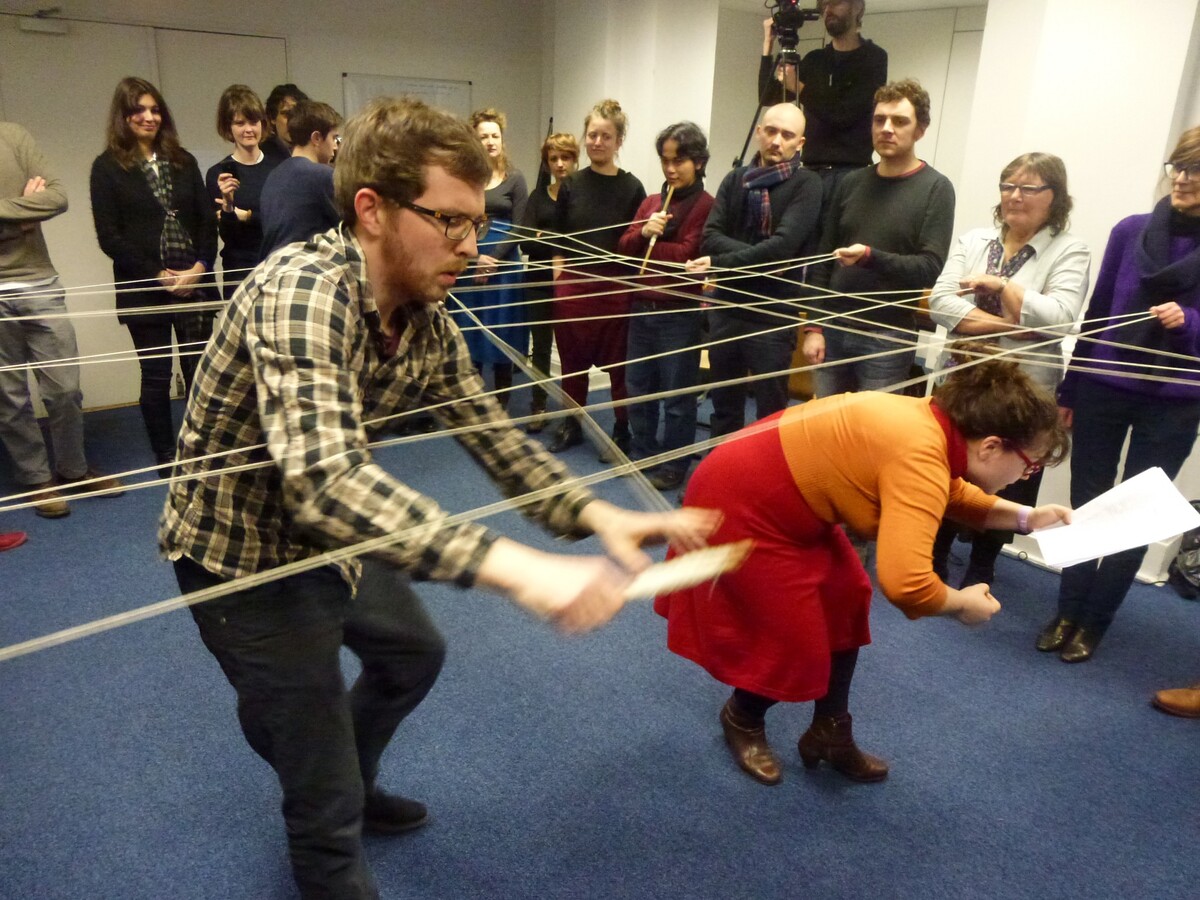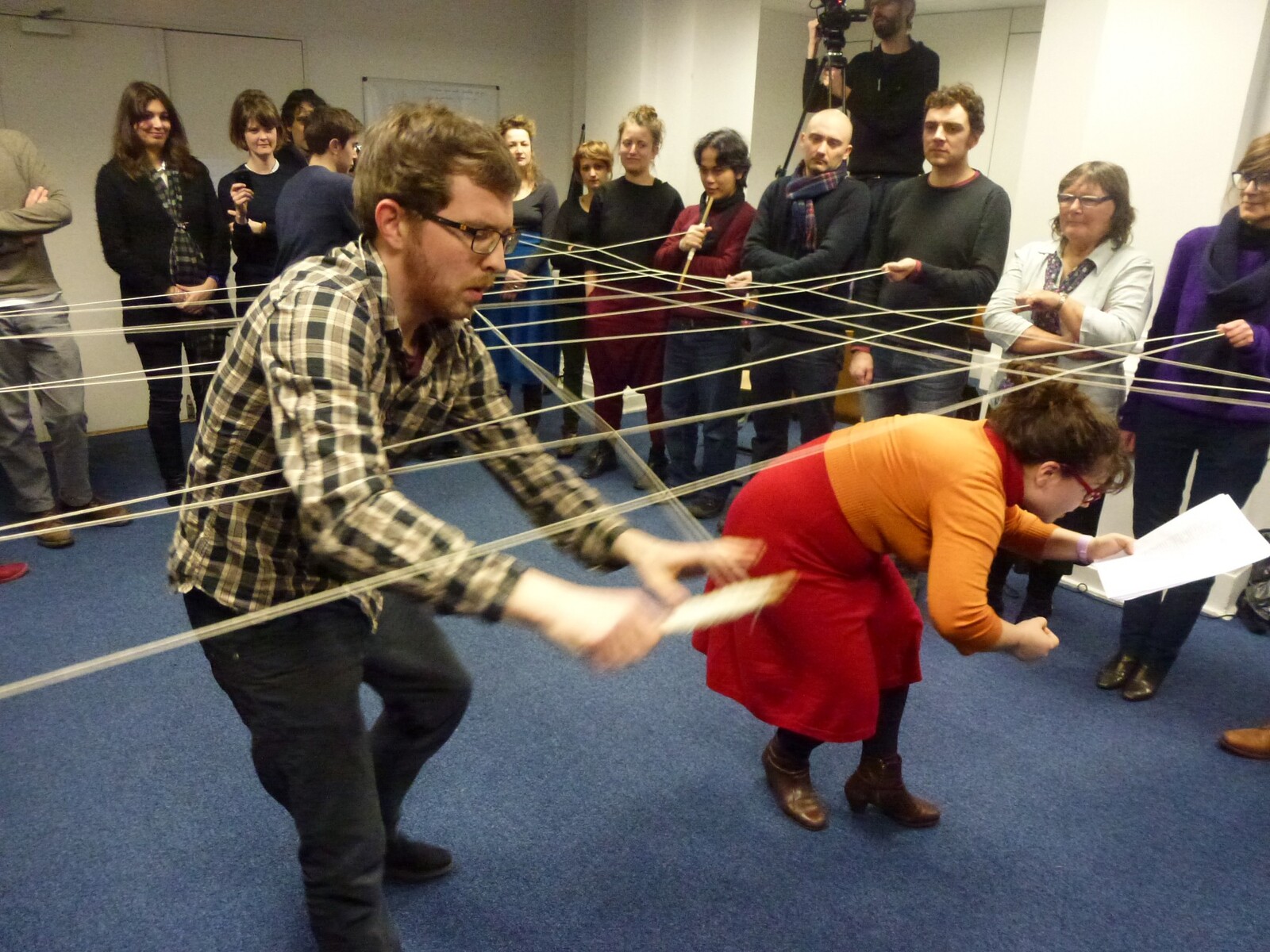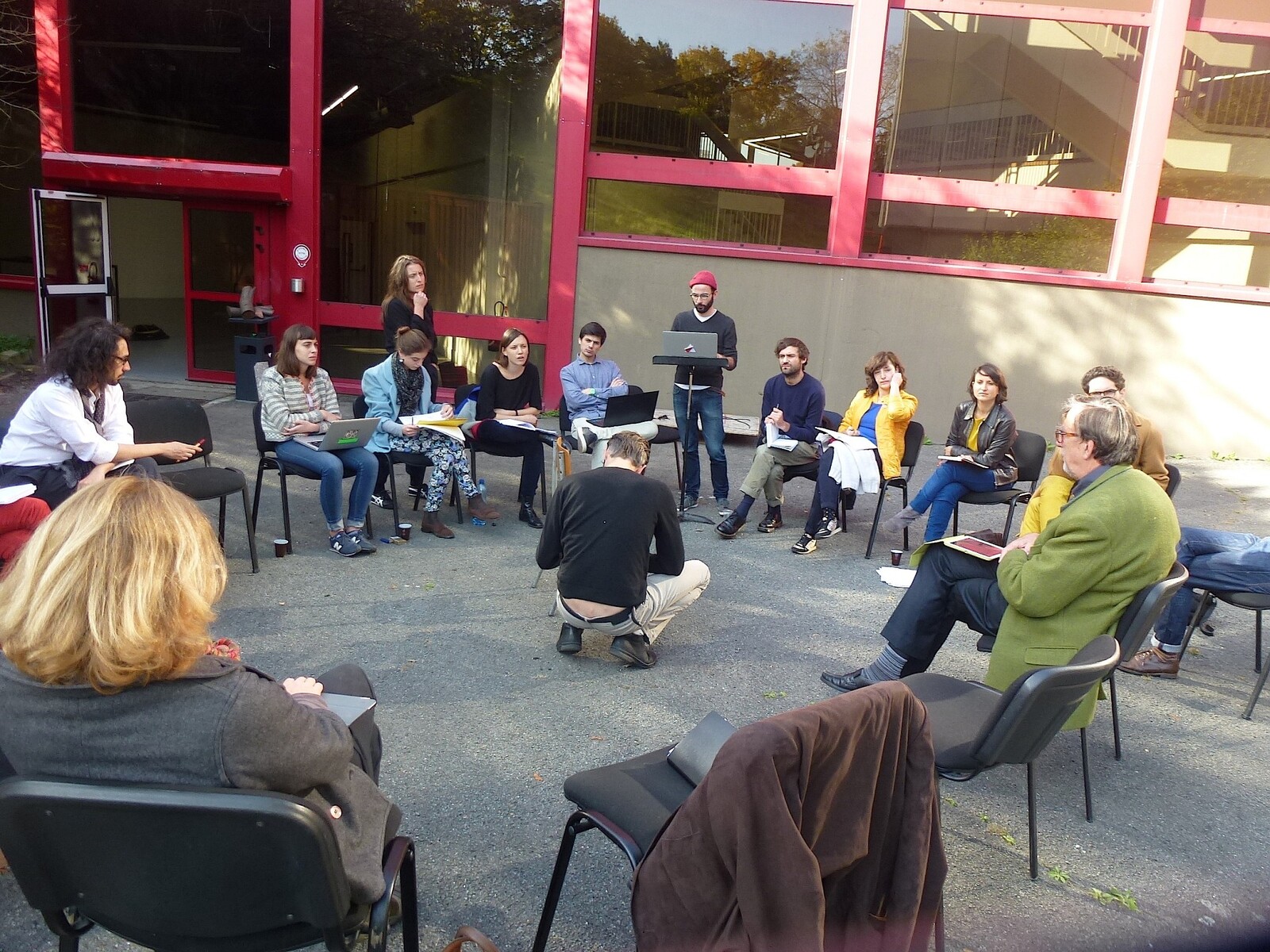http://speap.sciences-po.fr/en.php?item.8
Bridging the social sciences, politics, and the arts, SciencesPo Experimentation in Arts and Politics (SPEAP) is positioned at the crossroads of the disciplines, as one could define the work of its founding father—French philosopher Bruno Latour. Created in 2010 on behalf of Latour and collaborator Valerie Pihet at SciencesPo Paris, this highly selective multidisciplinary program accepts a circle of about fifteen participants (mostly thirtysomething professionals from the social sciences, the arts, and the political milieu) each year out of approximately eighty applications pooled internationally, of which nearly half are French. SPEAP is a little bit of everything—a one-year master’s program, a postdoctoral research hub, an école, a residency workshop, a therapy group, and a think tank. I even once heard Pihet call it an école de parole (talk school), inadvertently nodding to SPEAP’s hosting epicenter and namesake—SciencesPo, an elite social science and higher education training ground for politicians and public figures in Paris. In English, the acronym SPEAP stands for SciencesPo Experimentation in Arts and Politics, while in French it tends to shift to SciencesPo École des Arts Politiques, and like its name, confusion sometimes lies in what kind of program SPEAP technically is—but maybe this titular ambiguity is its crowning glory?
For those unfamiliar with SciencesPo, this is one of France’s reputable grandes écoles and is universally recognized for prepping government bigwigs, civil servants, and the intellectual elite (three of the last four French presidents graduated from the institution: Hollande, Chirac, and Mitterrand). Unlike universities, grandes écoles sit outside of the main framework of the French university system, and students are admitted via extremely rigorous written and oral exams—a selective, and in the past, criticized admission process for its lack of democratic transparency. SPEAP, however, is something of a backdoor that hasn’t succumbed to the traditional admission standards demanded by SciencesPo. On one hand, this institutional loophole aids atypical applicants who might otherwise turn away from classical learning frameworks like master’s coursework and thesis writing. On the other hand, it underlines SPEAP’s uncertain future within the institution, since its inception was tied to Latour’s active role within SciencesPo, serving as its Vice President of Research (2007–12), and his development, along with Pihet, of the Médialab in 2009, a research center within SciencesPo focused on digital humanities/social sciences, controversy mapping, text analysis, and visual network analysis. With Latour up for rumored retirement, a financial campaign has been launched to support SPEAP and drive it into a new era within the SciencesPo community, thus enabling a future generation of “SPEAPiennes,” as Latour affectionately calls his protégés. The question remains as to whether Latour’s Trojan horse strategy will continue to be an efficient move or if it will eventually bury SPEAP within this tower of power’s secret oubliette.
Advertised with a hefty price tag of 15,000 euros, students are eligible for private scholarships from SciencesPo, yet ideally each candidate comes with a funding structure from their home country or from private sources. On the upside, I can say that, if offered a scholarship, this program is very affordable compared to like-minded private institutions in the United States or the UK. And while the curriculum demands significant commitment from participants, it is still structured to allow them to work: core sessions are held weekly on Thursdays and collective research is schedule-permitting, an added bonus for active artists and researchers. Taught in both French and English, although realistically 70 percent in French, SPEAP is led by a nurturing and diverse pedagogic team: Jean-Michel Frodon, the noteworthy cinema critic and educator; newcomer Frédérique Aït-Touati, an academic who has collaborated for years with Latour on theater scenographies, notably their Gaia Global Circus that premiered at dOCUMENTA 13; National Center for Scientific Research anthropologist Sophie Houdart, also a newcomer this year; digital humanities and visual data designer Donato Ricci; and two young artists, Myriam Lefkowitz and Simon Ripoll-Hurier, both former SPEAP participants. From 2010 until 2014, Valerie Pihet spearheaded the program, yet with the announcement of her departure last summer it has since taken a more collaborative pedagogic approach. These are the individuals who hone the critical edges where participants meet “to bear on concrete societal and political issues, and to put their convictions to the test,” as Latour writes.
The course is divided into two simultaneous tracks: key talks and exercises led by Latour and his diverse and robust network of intellectuals, and then practical work, which I discuss later. SPEAP commences each fall with a week-long session on John Dewey, the American pragmatist and instrumentalist, whose The Public and its Problems (1927) lays the groundwork for grappling with issues around democracy, and is a key reference for subsequent internal discussions among SPEAP participants (the same could be said of Walter Lippmann and Alfred North Whitehead). To date, Latour typically leads this session, yet constructivist thinker Didier Debaise has been known to deliver it as well. The same goes for pragmatist ecologist Emilie Hache and philosopher Joëlle Zask, all French/Belgian researchers and academics related to the resurgence of pragmatist philosophy in French and Belgian institutions. The Dewey week makes up one of four compulsory intensive one-week sessions, and others have been organized around topics such as live feedback, the archive, the camera, and the role of nature in art and the social sciences. In the past, these intensives have been cohosted by educational partners such as the Forensic Architecture research group and the Centre for the Study of Invention and Social Processes—both at Goldsmiths, University of London—the master’s in Speculative Narration at the École Supérieure des Arts in Brussels, and, most recently, Parsons The New School for Design in New York’s Paris branch. Every year, SPEAP participants travel to meet with one of these programs, establishing a momentum of collaboration between institutional partners. The exercises, led by the core group of SPEAP instructors referenced above, include prompts such as defining a subject or image that politically mobilizes/demobilizes you, or describing your practice vis-à-vis its instruments and methods. Each exercise is tailored around the varied research practices that inform the instructors’ work. For example, Myriam Lefkowitz leads occasional body warm-up sessions, exploring notions of bodily attention and mindfulness—all extensions of her focus on the relation between motion and gaze, and reminders that the body and perception also play a pivotal role in methodological experimentation.
Technically, each student receives a master’s degree (though not a Master II, which is the building block for future doctoral work) with a title of Master d’Expérimentation Arts et Politique de l’Institut d’Études Politiques de Paris. When scrutinizing the makeup of the “students” however, one will notice that almost every recruit either already possesses a master’s degree, is well on their way in doctoral work, or has chosen SPEAP to foster their creative and/or analytical processes. Having participated in SPEAP myself in 2013–14, I can offer testimony that this is not a program that you come to for feedback on your professional work. Rather, your work experiences a slow and subtle transformation along the way. It could be best described as the development of a personal political ethos stretching beyond, say, conventional approaches to political art-making. Participants might share a kind of political crisis (a positive one, mind you) that brought them to look towards SPEAP in the first place. Or they could be searching for the tools to renegotiate their idea of a “public” or “political” imaginary. Portuguese artist and current SPEAP participant Nuno Da Luz felt the need to “embark on a kind of structure that would be necessarily plural and interdisciplinary while taking into consideration the world at large with all its conflicts … away from a certain contemporary art self-absorption.” Da Luz also expressed the personal need for theoretical rigor, but grounded in something speculative and playful, where theory informs practice and vice versa. I would argue that while the program may not follow a fixed theoretical pedigree, its hybrid approach allows for tapping into SciencesPo’s powerful resources, without curtailing institutional and pedagogic reflexivity.
Curiously, the contemporary arts are not solidly emphasized in the curriculum. While a few star-studded names are mentioned on the roster of visiting lecturers, such as Pierre Huyghe or Olafur Eliasson, there is a definitive absence of contemporary art in this program. I sense this may be intentional, and the lack might be connected to a greater problematic of where Latour actually lies within the contemporary arts. SPEAP proposes a kind of new terrain vague of art-methodology engineering that allows for different ways of conceptually sculpting inquires into form. A regular visitor at SPEAP, and known to deliver emotionally evocative workshops, is Vinciane Despret, the Belgian philosopher of science, who is considered a foundational thinker in the field of animal studies, focusing on the relationship between observers and the observed. Over the last two sessions, Despret asked participants to read written fragments by different philosophers, sociologists, historians, and literary figures on the subject of the dead in an effort to build relationships among them and uncover a narrative that could illustrate a particular vitality of absence. The preeminent German sociologist Ulrich Beck was also a recent visiting guest, just before his unfortunate passing on January 1 this year. Latour eulogized him in the Frankfurter Allgemeine Zeitung as an exceptional being who “put in the service of discovering what actors were in the midst of changing about their way of producing the social world.” When Beck visited SPEAP in December 2014, he was at the peak of his research on Risikogesellschaft (risk society), societal metamorphoses, and the making of “cosmopolitanism,” a term that Latour notes as not a call “for the universal human, but the redefinition of humans belonging to something other than nation-states.” His work, in a way, has been the axis of SPEAP’s inquiry this year, formulated around the following question: What happens to the self-interest of nation-state’s when their land is being morphed from beneath by other territorial connections? An array of stunning minds have visited SPEAP in the short time it has been in session. Weekly meetings have been led by notable scholars such as Northern Renaissance specialist Joseph Koerner, postgenderist feminist Donna Haraway, science historian Simon Schaffer, controversy analyst and issue-mapping specialist Noortje Marres, American author Richard Powers, filmmakers and Sensory Ethnography Lab heads Lucien Castaing-Taylor and Véréna Paravel, ethnopsychiatrist Tobie Nathan, Australian climate change specialist Clive Hamilton, and Brazilian perspectival anthropologist Eduardo Viveiros de Castro, to name a few.
The other half of the program is reserved for work towards collective projects. This year’s game-changing subject is climate change, and anyone familiar with the work of Latour can surmise that the focus falls between the crisis of nature and the disintegration of the commons. In past years, these projects pivoted around commissions that confronted a range of controversial subjects, where art met society in real-world dilemmas, and breakthroughs occurred in the ways the relationships between subjects and objects were understood. To some degree, the commission idea was born out of the Noveaux Commanditaires (New Patrons) program founded by François Hers in the 1990s—a radical philosophy which Hers described as “art without walls.” As a way to disregard today’s categorical hegemonies under capitalism, Hers’s model posits that the citizen, being equal to the artist, can acquire the authority to publicly express a need to create as well as to assess what is produced in the name of art. At SPEAP, commissions are initiated and sponsored by companies or organizations caught in some form of representational deadlock. SPEAP participants restituent (in French), or give back, an artistic/scientific offer to the commissioner that might provoke an alternative or quake in that organization’s system. Merging experimental inquiries that combine fieldwork, unconventional surveying, sociological methods, studio practice, and creative agency, over the years the commissions have included: housing for drug users in the Saint-Denis suburb of Paris (with the organization PROSES), how to make visible uses of public space undergoing change (a municipality situated in the north of Paris named Épinay-sur-Seine), a simulation of the Copenhagen Climate Summit (Sciences Po/IDDRI), and organizing new trash collection in the Belleville neighborhood of Paris (Les Biffins de Belleville). Ideally, what is gained at SPEAP isn’t left behind; that is to say, your commission can pass over into your professional work or it can continue to expand after the program. One drawback may be the laborious group work you must invest in, but the fruits of your work can transform many subjects, including yourself, your peers, and your corpus—this is the pragmatist offering that SPEAP purports to supply.
During its first four years, from 2010–14, SPEAP would meet at H008, a smallish classroom tucked in the back of one of SciencesPo’s seventeenth- to eighteenth-century hôtels particuliers in the heart of the legendary Saint-Germain-des-Prés neighborhood near the Assemblée Nationale (National Assembly) and French government ministries. Beginning this academic year the group now meets in a basement theater of the Théâtre des Amandiers, a historical theater on the outskirts of Paris. The reason for this is twofold: the theater has invited SPEAP to do a residency there for three years, and it is also the hub for this year’s collective project—a mock debate–style simulation of the upcoming Climate Conference COP21, to be held in Paris in December 2015. Titled “Paris Make it Work,” this “theater of negotiations,” as Latour calls it, will take place in May and seeks to mobilize all of SciencesPo and outside parties to participate in a five-day negotiation meeting of historic significance, in which “countries” will have to come up with a universal and binding agreement to limit climate change to two degrees Celsius above preindustrial levels, and agree upon a suitable carbon emissions number for governments to implement. I understand SPEAP’s role in this year’s project as conceiving mobilization tactics, developing alternative plots for the negotiations, and assembling the public, all in an effort to generate a kind of model as scientists do—but within the theater. I visited the theater as they prepared for the simulation. That day, participants were split into three groups that were tasked with delivering short and poignant theoretical reflections on concepts termed Territory, Commons, and Negotiation. I couldn’t help but recall Ulrich Beck. When asking Brazilian filmmaker and theoretician Ana Vaz, a member of the Commons group, how their group presentation was conceived, she replied, “From the beginning it was to be radically dismembered in order for it to be constructed again.” After meandering through indirect goals, the group eventually decided to focus on Donna Haraway’s proposition of an affinity politics, “meaning that we would work around our zones of affinities, personal and shared, but that these zones should exist autonomously rather than constitute a kind of identity pole.” Amidst this conceptually rich and intellectually feverish day, I witnessed the groups tease out their inquiries, positions, and doubts in varied ways—such as the script produced by the Negotiation group in which participants enacted the formation of different climate factions—with all the SPEAPiennes, Latour, and the pedagogic team gathered around a table. Like the scenography that SPEAP will develop in May in collaboration with Parsons The New School and Raumlabor, a group of Berlin-based architects, an ethos of a “togetherness that does not efface a oneness,” as Vaz described it best, was made clear that day as a model for nonhierarchical negotiations. At one point, personal fieldwork examples were shared, such as Norwegian journalist and SPEAP participant Elida Høeg’s description of a Peruvian community called Alto Huancané currently under copper-mining siege. Because Høeg was dispatched to the Lima COP20 for her job, she was able to access this community with questions in order to reinforce her SPEAP presentation. At the break, while slipping through one of the theater’s dark corridors on the way to SPEAP’s community lunch, I bumped into Latour, who muttered to me, “It’s fascinating,” everyone is working on “concepts like the Anthropocene, geo-ontologies, and new animisms today.”
Ideally, the “theater of negotiations” could end up being a testing ground for the climate change debate, highlighting material entanglements and hybrid approaches that might be overlooked by dominant power structures—the challenge being whether the theater can hold sway in the larger political and social arena. Another challenge is that the Théâtre des Amandiers doesn’t have the centeredness of the 7th arrondissement to warrant it immediate attention from other parties. If there is to be a real-world ripple with this material, we will need to see media coverage getting the message out. (And mind you, it does require taking a suburban RER A train to the commune of Nanterre, west of central Paris, trailing through a sizeable park dotted with eighteen fantastical grands ensembles—until you reach the rear of the Théâtre des Amandiers.) Yet—and this opinion is very much informed by my own participation—I remain hopeful that some kind of greater political mobility will be enacted, and that it will pressure the powers-that-be to consider real alternatives, as the conference in December aims to do. SPEAP’s larger aim is to offer students a way to rethink the social by prioritizing means over certain ends. When asked how SPEAP will actually work with the student bodies to mobilize them so that everything moves forward smoothly and correctly, Vaz eagerly replied, “There are many bodies, student and otherwise.” Implying that each of these bodies offers different methods and perspectives, this response resonates with Latour’s insistence on examining the various associations and assemblages of any problem. In the words of a true SPEAPienne, Vaz added: “I am not sure about the quality of ‘correctly,’ but I hope for something that threatens with the incorrect, only so we can perhaps really think of an(other) correction.”
—Jennifer Teets






